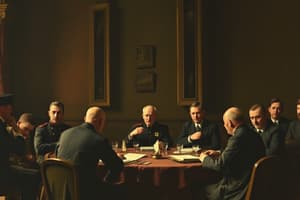Podcast
Questions and Answers
What was the mood in London immediately after the end of World War I according to Source 1A?
What was the mood in London immediately after the end of World War I according to Source 1A?
- Joyful and enthusiastic (correct)
- Somber and reflective
- Angry and resentful
- Indifferent and apathetic
How did General Jack's perspective in Source 1B differ from the festivities in London?
How did General Jack's perspective in Source 1B differ from the festivities in London?
- He looked forward to immediate celebrations.
- He was indifferent to the end of the war.
- He felt relief and gratitude for the end of suffering. (correct)
- He favored further conflict rather than peace.
Which country represented at the Versailles negotiations was likely the most affected by World War I?
Which country represented at the Versailles negotiations was likely the most affected by World War I?
- Italy
- France (correct)
- Germany
- United States
Which country was likely considered the weakest at the Versailles negotiations?
Which country was likely considered the weakest at the Versailles negotiations?
Which country least affected by the war may have been represented at Versailles?
Which country least affected by the war may have been represented at Versailles?
How might the democratic nature of the countries at the negotiations influence the treaty?
How might the democratic nature of the countries at the negotiations influence the treaty?
Which countries were notably absent from the Versailles negotiations despite involvement in the war?
Which countries were notably absent from the Versailles negotiations despite involvement in the war?
What was Woodrow Wilson's primary aim at the Versailles negotiations?
What was Woodrow Wilson's primary aim at the Versailles negotiations?
What was one of the main objectives of Woodrow Wilson's Fourteen Points?
What was one of the main objectives of Woodrow Wilson's Fourteen Points?
Which point reflects Wilson's vision regarding international agreements?
Which point reflects Wilson's vision regarding international agreements?
What was Clemenceau's primary aim in the peace negotiations?
What was Clemenceau's primary aim in the peace negotiations?
Which aspect of Wilson's Fourteen Points did Lloyd George disagree with?
Which aspect of Wilson's Fourteen Points did Lloyd George disagree with?
How did the major leaders view the punishment of Germany after World War I?
How did the major leaders view the punishment of Germany after World War I?
Which of the following points included in Wilson's Fourteen Points aimed at colonial issues?
Which of the following points included in Wilson's Fourteen Points aimed at colonial issues?
What was a key feature of the negotiations after the war, according to the leaders involved?
What was a key feature of the negotiations after the war, according to the leaders involved?
Which point emphasized the need for a new organization to mediate international disputes?
Which point emphasized the need for a new organization to mediate international disputes?
Flashcards are hidden until you start studying
Study Notes
End of World War I
- The fighting in World War I ended November 11, 1918
- Reactions to the end of the war were mixed and varied by location and perspective
Treaty of Versailles
- Representatives from victorious nations met in Versailles, France to negotiate peace terms with the defeated powers
- The Treaty of Versailles was written in 1919 and presented to the defeated nations.
Four Countries at Versailles
- France: Clemenceau was France’s representative, desiring revenge and German weakness to prevent future attacks.
- Great Britain: Lloyd George represented Great Britain, concerned about punishing Germany too harshly while navigating political pressures to “make Germany pay.”
- United States: Woodrow Wilson led the American delegation with an idealistic vision of peace and security, promoting his Fourteen Points.
- Italy: Held a lesser role in the negotiations but aimed to secure territorial gains as a victorious nation.
Wilson's Fourteen Points
- A blueprint for peace intended to prevent future wars
- Included: open diplomacy, freedom of the seas, reduction of arms, self-determination for peoples, and a League of Nations for dispute resolution
- Focused on achieving peace through international cooperation rather than punishing Germany.
Negotiating Peace
- Disagreements arose between the victorious nations
- Wilson's ideals were met with resistance from Clemenceau (France) and Lloyd George (Britain)
- Wilson, Clemenceau, and Lloyd George all had different goals and agendas, leading to negotiations and compromises
Outcomes of Versailles
- The Treaty of Versailles was ultimately signed by Germany in 1919.
- The treaty heavily punished Germany, resulting in significant territorial losses, severe economic reparations, and military limitations.
- The treaty's harsh conditions, including strict punishments, sowed resentment and contributed to political instability in Germany, laying the groundwork for future conflict.
Studying That Suits You
Use AI to generate personalized quizzes and flashcards to suit your learning preferences.




